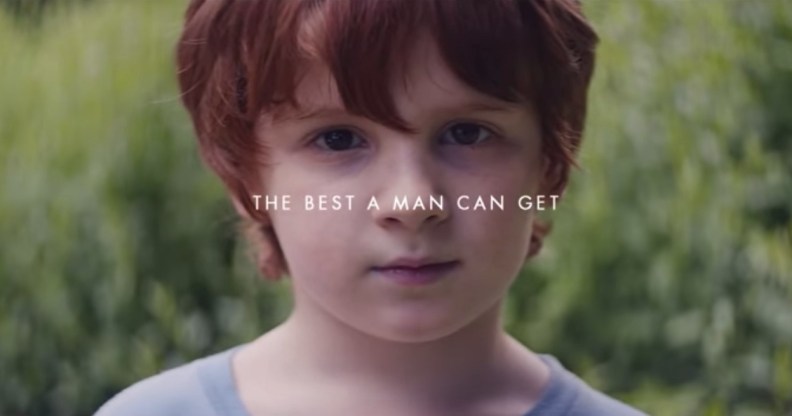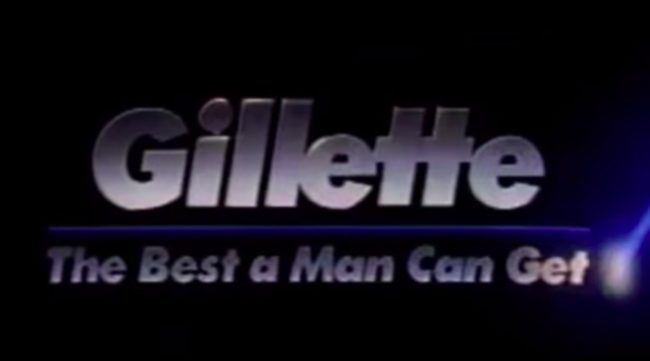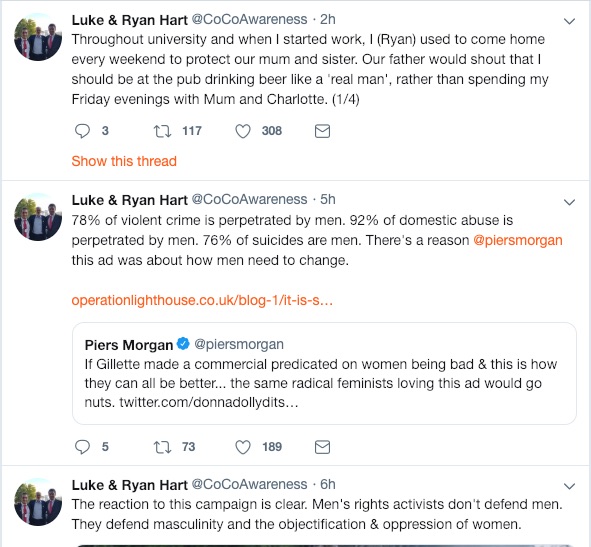Gillette ‘toxic masculinity’ ad backlash shows why it’s needed

The new Gillette ad received nearly 3 million views on Youtube within the a day of its release, (Gillette/YouTube)
To understand the state of society’s polarisation in 2019, look no further than the difference between the ‘thumbs up’ and the ‘thumbs down’ count on the newly-released Gillette ad on YouTube.
The beauty and grooming company published a 90-second video on Sunday (January 13) advertising its products and a charitable programme in support of men and boys in the US.
Starting from its trademark tagline “the best men can get,” the Gillette ad questions both the meaning of “best” and its previous marketing practices revolving around sex appeal to promote a new image of masculinity—one based on respect, accountability and being a role model.
The video has received over three million views, but more than 280,000 YouTube users expressed their dislike for the ad, compared to 50,000 who registered their support.
At a glance, a large number of the 75,000 comments the video received expressed outrage at the idea of criticising certain aspects of masculinity that are considered “toxic”—a number of these comments were also tainted by homophobia and transphobia.
What is toxic masculinity?
Just last week, the American Psychological Association (APA) issued a first-of-its-kind report on the topic of masculinity, defining “components of traditional masculinity” as including “emotional stoicism, homophobia, not showing vulnerability, self-reliance, and competitiveness.”
According to the psychologists, raising children with such “constricted notions of masculinity emphasising aggression, homophobia, and misogyny may influence boys to direct a great deal of their energy into disruptive behaviors such as bullying, homosexual taunting, and sexual harassment rather than healthy academic and extracurricular activities.”
The Gillette ad portrays “toxic masculinity” as a series of behaviours including bullying, fighting, sexually harassing and assaulting women.

Gillette questioned its former tagline and the meaning of being “the best” in its new ad tackling toxic masculinity.
Gillette’s main message is delivered by actor and former NFL star Terry Crews—who retweeted the ad—in the form of a clip from his June 2018 testimony on Capitol Hill as a survivor of sexual assault.
“Men need to hold other men accountable,” Crews can be heard saying, before the ad proceeds to highlight positive examples of masculinity—calling out sexual harassment, breaking up fights and being a role model to young children.
“Gillette believes in the best in men,” said P&G Global Grooming president Gary Coombe, discussing the ad in a press release. “By holding each other accountable, eliminating excuses for bad behavior, and supporting a new generation working toward their personal ‘best,’ we can help create positive change that will matter for years to come,” he added.
“The Gillette
#TheBestMenCanBe campaign highlights how so many men feel afraid of having their beliefs challenged. Don’t be. Create yourself.”— Luke & Ryan Hart
Gillette also partnered with the Building a Better Man Project, an organisation set up by three psychologists with the goal of reducing violence and redefining masculinity, pledged to donate $1 million per year for the next three years to initiatives supporting the development of boys and men. The first organisation they picked is a quintessential institution of American childhood—The Boys & Girls Clubs of America.
In releasing the ad, Gillette also announced the results of a study it commissioned among 1,188 adults in the US, which found that the four traits that define a “great man” are honesty, moral integrity, hard-working, and respectful to others.
What are the reactions to the Gillette ad?
Some people, on YouTube and other social media platforms, condemned the ad as the product of “radical feminism.” Some pledged to boycott Gillette and its parent company Procter & Gamble (P&G), sharing graphs including all the logos of the brands falling under the global corporation.
Pretty much every commentator on the rightwing or conservative spectrum has criticised the ad. TV host Piers Morgan condemned it as “man-hating.”
Others just took a lighthearted approach. Comedian Ricky Gervais joked: “I used to love beating up kids at barbecues. Now I realise that is wrong. Also, my balls have never been smoother. Thanks, Gillette.”

Luke and Ryan Hart, who campaign against domestic abuse, defended the Gillette ad against its detractors. (Screenshot/Twitter)
Thousands of people, however, responded positively. Some, like Pose writer and producer Our Lady J, said they were moved to tears. Others thanked Gillette for starting a conversation on the topic.
Brothers Luke and Ryan Hart, who became campaigners on the issue of domestic violence after their father killed their mother and sister before turning the gun on himself, wrote a deeply personal Twitter thread inspired by the Gillette ad.
The thread concluded: “The Gillette #TheBestMenCanBe campaign highlights how so many men feel afraid of having their beliefs challenged. Don’t be. Create yourself. Don’t just adopt the Man Box from your father. We need to create a better man. We need to expect more from men.”
PinkNews has contacted Gillette for comment.

